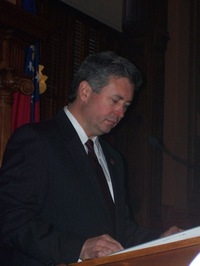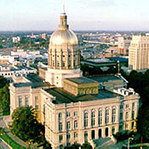
That white America retains its racist edge is a fact.
As Dr. Charles Franklin noted recently, even the 2008 Exit Polls show white support for Democrat Barack Obama falling off a cliff once the black population of a state hit 25%.
This defines the Deep South. Blacks vote Democratic, whites Republican. Both sides suffer as a result. Real elections are in the primaries, and all reformers are at a disadvantage as incumbent machines hint (subtly or not) that their efforts at bipartisanship are a form of racial sell-out.
Little has changed since the 1960s, except instead of all-white Democratic machines holding all power we now have two sets of machines, one white and one black. The move was gradual, down the ballot, but once the tipping point was reached in each state the move was both total and irreversible.
In 2002 the tipping point was reached in Georgia. The state’s first Republican Governor since Reconstruction, Sonny Perdue, was elected. This caused the state’s money power to flip entirely to the Republicans, who took over both houses of the state legislature in 2004.
And instituted their machine.
The leader of that machine, on the House side, is Glenn Richardson. Like the other leaders of the state’s Republicans he lives in the Atlanta exurbs. Specifically he lives in Hiram, Georgia, which is in Paulding County, about 25 miles north-by-northwest from Atlanta proper.
Richardson, 52, lives just a few miles north of his birthplace in Douglas County. He is a highly incurious man who operates from self-interest, his own and that of people like him. He got his law degree from Georgia State in Atlanta in 1984 and almost immediately joined a politically-connected law firm for which he is now a name partner. He rose steadily along with his party, winning his legislative seat in 1996. His district is northeast of that held by the late Democratic Speaker Tom Murphy, and while his leadership style is based on the same ruthlessness and bombast, his method for gaining power is quite different.
The key to Richardson’s rule is money. As soon as he became Speaker, in 2005, he put his plan into action.
It’s quite simple. State law limits contributions to any candidate
to $2,000 for a primary, $2,000 for the general election and $1,000 for
a run-off, if that becomes necessary. Richardson began demanding $5,000
up-front from businesses who needed the government’s cooperation, payable directly into his campaign account. Later, he started bundling
these contributions — taking multiple $5,000 hits from a company
chairman, from each of their family members, and from any other
executives who felt they needed to get in, as well as from companies affiliated with the contributor.
State legislative races are not expensive. There is no sense buying
TV, even newspaper space. The main tools are direct mail and phone
calls. A race that actually costs $50,000 to run is a competitive race.
Within a year Richardson had amassed nearly $500,000 in his campaign
account, and the number has been rising ever since.
Where does the money come from? In this decade it mainly came from
real estate interests — the homebuilders turning counties like
Paulding into nearly all-white exurban satellite communities. To that
you can add title loan operators, essentially loan sharks who lend
money on car titles at usurious interest rates, and other bankers.
Richardson encouraged members of his leadership team to do as he did. Each amassed war chests of hundreds of thousands of dollars,
despite the fact that they had no opponents. This money has become a
slush fund which can be used to fund loyal candidates, or for any
purpose the politician desires. In the past Democratic legislators used
their campaign war chests as a sort of retirement fund.
Richardson controls his body like a medieval lord controlled his keep. No opposition is brooked. In 2006, for instance, he ordered a mid-decade redistricting solely to thwart the attempt of a popular Democrat, Jane Kidd of Athens,
from winning a State Senate seat. (Kidd is now leader of the State Democratic Party.)
After two disastrous legislative
sessions that would have broken anyone else, he was challenged for the
speakership by Republican David Ralston this month, but was able to beat him easily. (Ralston never played the money game as aggressively as Richardson — no one does.) This was partly because he spent the 2008 campaign season spreading his wealth around. Republicans lost no ground in the 2008 legislative elections.
Richardson’s obsession in the legislature involves eliminating taxes
on rich white folks and putting more taxes on poor black folks. He is a class warrior. This
means limiting the use of property taxes
to fund local government and pushing everything on to sales taxes
instead. Thanks to local government opposition he failed to pass his
sales tax plan, which he dubbed GREAT, and this was behind the failed challenge to his speakership.
Richardson, and his leadership colleagues, are also big on sprawl.
He is a big supporter of wide highways, an iron lock against any
expansion of mass transit, and is now pulling air traffic away from the city.
Why? Because the cities are run by black folks, the exurbs by white
folks. Sprawl, in this case, is racial politics in action.
Most of Richardson’s fights, in fact, are with other Republicans,
notably Governor Perdue and Lt. Governor Casey Cagle, the
Governor-in-waiting. Their disagreements
turned the 2008 l
represent conservatism in the sense of don’t make waves. Richardson’s
conservatism is of the more aggressive, ideological, Newt Gingrich
school, big ideas from the dreams of big men like Louis XIV.
There is competition within the Georgia GOP. There are factions. There is a Main Street business faction, led by Lt. Governor Cagle, that acknowledges the need for Atlanta and is status-quo in outlook. There is a Religious Right faction, led by State Sen. Chip Rogers (right), which provides the party its foot soldiers. Rogers’ obsession in the last session was immigration and he beat an Hispanic challenger 3-1 in the 2008 election. Then there are the "right-roots," ideological conservatives like Buzz Brockway, Erick Erickson and Jason Pye who are essentially libertarian in outlook.
In a competitive political environment people like Richardson could
do little harm. Their peccadilloes or extremism would soon do them in.
But because of the way he uses money, and because voting is racially
charged, there is no way to pull Richardson down. He will have to pull
himself down, to be replaced, probably, by someone just like him.
Or worse.











